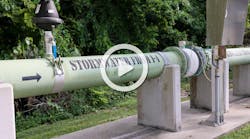Venezuela to Clean Up the Guaire River With IDB Support
The Inter-American Development Bank (IDB) has approved two loans totaling $400 million for projects to clean up the Guaire River in metropolitan Caracas and improve water quality management in communities of more than 5,000 inhabitants in the Bolivarian Republic of Venezuela.
A loan for $300 million will help finance works in 12 subbasins of the Guaire River that will collect, channel, separate and dispose of sewage. It will also support socio-environmental initiatives to prevent and reduce vulnerability of surrounding communities to flooding and landslides.
A second loan for $100 million will finance improvements in water quality management in communities of 5,000 to 500,000 inhabitants.
During its four-year implementation period, the program will construct and rehabilitate more than 90 kilometers of collectors, build a pumping station in San Pedro, construct 19 sediment retention and flood prevention structures and carry out 22 works for socio-environmental refurbishment and restoration.
"As a result of these development works, the percentage of sewage and waste managed in the 12 subbasins is expected to increase to almost 90%," said Rudi Luis Cressa, IDB team leader.
Studies have shown that in the metropolitan area, over 80% of sewage―mainly domestic but also industrial―is discharged into streams in the Guaire River’s 32 subbasins.
Treatment plants are to be constructed between the start of 2014 and early 2015, once the sewage systems are in place along with infrastructure for collecting, transporting, separating and discharging sewage in the subbasins of the Guaire River.
The project’s goal is to provide sewerage and treatment services for the citizens of the Caracas metropolitan area to improve their living standards and the quality of local water resources.
The project to improve water quality management will focus on the rehabilitation and/or expansion of operational infrastructure in water treatment plants and laboratories as well as measures to strengthen the management of potable water service in the areas of operation, maintenance and quality control.
"This project will help to improve the quality of life for many families living in small and medium-sized cities,” said Cressa. The project will benefit some 1.4 million inhabitants of towns and cities of between 5,000 and 500,000 population.
The project aims to rehabilitate and/or expand 18 water treatment plants, equip and placing into service 40 quality control laboratories in different regions of the country, and carry out 70 training workshops in the areas of operation, maintenance and quality control of water treatment plants.
These loans will contribute to the country's strategy to maintain and improve potable water access and quality of drinking water and provide sanitation for all its population.
Both loans have 25-year terms, with five and one-half-year grace periods and variable interest rates based on Libor. The government will provide counterpart funding of $70 million for the Guaire River sanitation project and $42 million for the water quality management project.
Source: IDB


